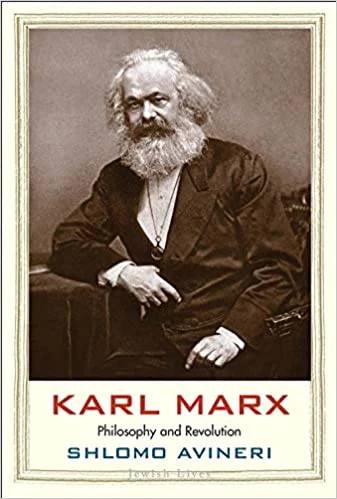Was Marx influenced by his Jewish background? It would seem so, if one believes Shlomo Avineri’s book Karl Marx: Philosophy and Revolution. Praised for his “sympathetic and thoughtful interpretation of Karl Marx's view of religion”, Avineri says in his book, "Merely criticizing religion, without trying to identify the concrete social conditions that give rise to it, is to Marx shadow boxing, and unlike many other radicals, he finds it a waste of time.”
The author of the 2019 book argues, “The battle has to be engaged against real social conditions, not against religion, which is just an expression of them. To use a later term of Marx, religion is part of the superstructure, and true radicalism has to go to the roots, to the social and economic infrastructure. This is the moment Marx parts company with the other Young Hegelians, whose trajectory continues to focus on a critique of religion: to Marx this is an exercise in futility."
Shlomo Avineri in his book, which is part of the prizewinning Jewish Lives series, explores Marx's life through his intellectual contributions to modern thought, pointing out, while Marx is considered “philosopher, historian, sociologist, economist, current affairs journalist, and editor”, apart from being “one of the most influential and revolutionary thinkers of modern history”, he is “rarely thought of as a Jewish thinker”, regretting, “His Jewish background is either overlooked or misrepresented.”
Avineri believes, Marx’s Jewish origins did leave a significant impression on his work. Marx was born in Trier, then part of Prussia, and his family had enjoyed equal rights and emancipation under earlier French control of the area. But then its annexation to Prussia deprived the Jewish population of its equal rights. These developments led to the reluctant conversion of Marx’s father, and similar tribulations radicalized many young intellectuals of that time who came from a Jewish background.
And this is what Marx said about religion:
“Man makes religion, religion does not make man. Religion indeed is man’s self-consciousness and self-estimation while he has not found his feet in the universe. But Man is no abstract being, squatting outside the world. Man is the world of men, the State, society. This State, this society produces religion, which is an inverted world-consciousness, because they are an inverted world.
“Religion is the general theory of this world, its encyclopædic compendium, its logic in popular form, its spiritualistic Point d’honneur, its enthusiasm, its moral sanction, its solemn complement, its general basis of consolation and justification. It is the fantastic realization of the human being, inasmuch as the human being possesses no true reality. The struggle against religion is therefore indirectly the struggle against that world whose spiritual aroma is religion.
“Religious misery is in one mouth the expression of real misery, and in another is a protestation against real misery. Religion is the moan of the oppressed creature, the sentiment of a heartless world, as it is the spirit of spiritless conditions. It is the opium of the people.” [Excerpt From: Karl Marx. “Delphi Collected Works of Karl Marx (Illustrated) (Delphi Series Seven Book 23)”, Apple Books]
The author of the 2019 book argues, “The battle has to be engaged against real social conditions, not against religion, which is just an expression of them. To use a later term of Marx, religion is part of the superstructure, and true radicalism has to go to the roots, to the social and economic infrastructure. This is the moment Marx parts company with the other Young Hegelians, whose trajectory continues to focus on a critique of religion: to Marx this is an exercise in futility."
Shlomo Avineri in his book, which is part of the prizewinning Jewish Lives series, explores Marx's life through his intellectual contributions to modern thought, pointing out, while Marx is considered “philosopher, historian, sociologist, economist, current affairs journalist, and editor”, apart from being “one of the most influential and revolutionary thinkers of modern history”, he is “rarely thought of as a Jewish thinker”, regretting, “His Jewish background is either overlooked or misrepresented.”
Avineri believes, Marx’s Jewish origins did leave a significant impression on his work. Marx was born in Trier, then part of Prussia, and his family had enjoyed equal rights and emancipation under earlier French control of the area. But then its annexation to Prussia deprived the Jewish population of its equal rights. These developments led to the reluctant conversion of Marx’s father, and similar tribulations radicalized many young intellectuals of that time who came from a Jewish background.
And this is what Marx said about religion:
“Man makes religion, religion does not make man. Religion indeed is man’s self-consciousness and self-estimation while he has not found his feet in the universe. But Man is no abstract being, squatting outside the world. Man is the world of men, the State, society. This State, this society produces religion, which is an inverted world-consciousness, because they are an inverted world.
“Religion is the general theory of this world, its encyclopædic compendium, its logic in popular form, its spiritualistic Point d’honneur, its enthusiasm, its moral sanction, its solemn complement, its general basis of consolation and justification. It is the fantastic realization of the human being, inasmuch as the human being possesses no true reality. The struggle against religion is therefore indirectly the struggle against that world whose spiritual aroma is religion.
“Religious misery is in one mouth the expression of real misery, and in another is a protestation against real misery. Religion is the moan of the oppressed creature, the sentiment of a heartless world, as it is the spirit of spiritless conditions. It is the opium of the people.” [Excerpt From: Karl Marx. “Delphi Collected Works of Karl Marx (Illustrated) (Delphi Series Seven Book 23)”, Apple Books]


Comments